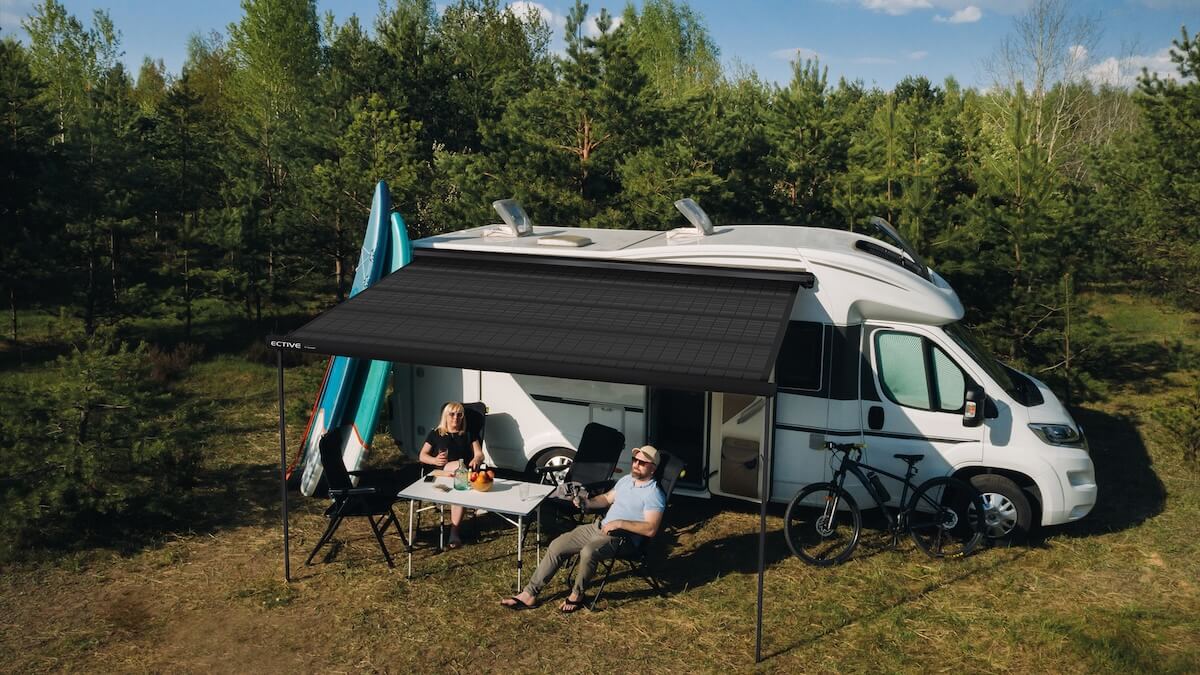The article Solar awning for campers: is it worth it? first appeared in the online magazine BASIC thinking. With our newsletter UPDATE you can start the day well informed every morning.

More and more campers are relying on solar modules so that they can be independent of power connections while on the move. A rollable solar awning for campers could make this even more efficient. But is such a purchase actually worth it?
PV modules on the roof or mobile “solar cases” are now almost standard equipment, especially for motorhomes and vans. This means that lamps, the refrigerator or chargers can be operated reliably even away from traditional campsites.
This of course increases flexibility for travelers. With a solar system on the camper, an external power connection is often not necessary for days. If used sparingly, it is even possible to stand free for longer periods of time away from campsites.
To date, however, such solar solutions have mostly been installed rigidly or as fixed modules on the roof of the motorhome. However, this could change with a rollable solar awning. The German manufacturer Ective wants to offer an “elegant, integrated solution”.
Is a solar awning for the camper worth it?
Whether it’s an awning or an awning, protection from the sun or rain is essential when camping. An awning installed directly on the camper makes this protection flexible and extends the living space outside.
In the future, campers would not only be able to protect themselves from sunlight, but could even use this solar energy. This is what the German manufacturer Ective is planning with its rollable solar awning.
According to the manufacturer, the integrated solar cells can collect up to 4.5 kilowatt hours of electricity per day. The use of flexible CIGS technology makes the modules more efficient than silicon solar cells – especially at very high temperatures.
The flexible solar cells, which can be rolled up like a normal awning while driving, offer great flexibility and can be rolled in and out using a small motor at the push of a button.
Solar awnings are no longer uncommon on the market. However, the model from the US manufacturer Xponent, for example, consists of robust glass modules. Although these are stable, they have to be stored in a large cassette.
Can the solar awning cover the electricity needs of the camper?
With a possible output of 4.5 kilowatt hours, the solar awning from Ective offers a solid foundation for life in a camper. In addition, the awning enables a constant supply of energy even in changing light conditions thanks to its 360 degree rollable solar cells.
In an example of a solar system in a small motorhome calculated by the ADAC For example, for two people a daily electricity consumption of 480 watt hours. And even for a family of four in a caravan, the solar awning with 4.5 kilowatt hours could easily cover the electricity requirement of 850 watt hours.
The right storage technology is also important for this. “An unsuitable battery can lead to functional failures, premature wear and even defects,” explains ADAC technology expert Burkhard Böttcher. The weight should also be taken into account so that the campers as a whole remain under the permissible total weight of 3.5 tons.
Also interesting:
- Coexistence: offshore wind power and sustainable fishing
- “Living cement” turns houses into energy storage
- CO2 balance: The location of solar systems makes significant differences
- Why electric cars use more energy on the highway
The article Solar awning for campers: is it worth it? first appeared on BASIC thinking. Follow us too Google News and Flipboard or subscribe to our newsletter UPDATE.
As a tech industry expert, I believe that solar awnings for campers can be a valuable investment for those who enjoy outdoor adventures and want to reduce their carbon footprint. By harnessing the power of the sun, these awnings can provide a sustainable source of energy to charge devices, run appliances, and power lighting while on the go.
Not only do solar awnings offer a convenient and eco-friendly way to power your camper, but they also provide a sense of independence and self-sufficiency. With the ability to generate electricity wherever you go, you can stay off the grid for longer periods of time and enjoy the freedom of exploring remote locations without worrying about running out of power.
While the upfront cost of installing a solar awning may be higher than traditional power sources, the long-term savings on fuel and electricity bills can make it a worthwhile investment. Additionally, the environmental benefits of reducing greenhouse gas emissions and reliance on fossil fuels cannot be overstated.
Overall, I believe that solar awnings for campers are definitely worth considering for those looking to enhance their camping experience, reduce their environmental impact, and enjoy the benefits of sustainable living on the road.
Credits